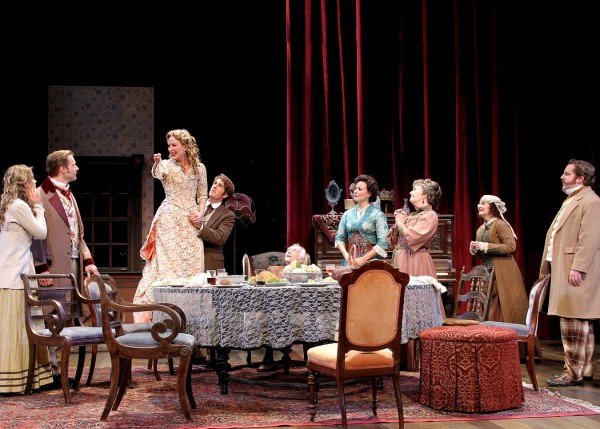In today’s Wall Street Journal drama column I review two backstage comedies, the Shakespeare Theatre of New Jersey’s revival of Trelawny of the “Wells” and the New York premiere of Golden Age. Here’s an excerpt.
* * *
One hundred years ago, Arthur Wing Pinero was one of the most successful playwrights of the Vicwardian era. Today he’s a footnote, if that. Might it be time to check him out again? Several British companies have mounted Pinero revivals in recent months, and now the Shakespeare Theatre of New Jersey has taken the plunge with “Trelawny of the ‘Wells,'” an 1898 backstage “comedietta” (Pinero’s word) that hasn’t been seen in New York since 1975. I feared that it would be a stale period piece, but I couldn’t have been more wrong: “Trelawny of the ‘Wells'” is charming and fresh, and this production, staged with total sympathy by Bonnie J. Monte, the company’s artistic director, is convincing in every way.
 The title of the play refers to Rose Trelawny (Nisi Sturgis), the spunky young ingenue of London’s Bagnigge-Wells Theatre, who has decided to retire from the stage, marry a well-to-do young gentleman (Jordan Coughtry) and renounce forevermore the disreputable ways of “the profession” (as she and her fellow actors call it). No sooner does Rose meet her beau’s paralyzingly proper grandfather (Edmond Genest), though, than she finds herself longing for the uninhibited warmth of her old friends, and the comic melodrama that ensues, which was Pinero’s specialty, is as delectable now as it was in his own day….
The title of the play refers to Rose Trelawny (Nisi Sturgis), the spunky young ingenue of London’s Bagnigge-Wells Theatre, who has decided to retire from the stage, marry a well-to-do young gentleman (Jordan Coughtry) and renounce forevermore the disreputable ways of “the profession” (as she and her fellow actors call it). No sooner does Rose meet her beau’s paralyzingly proper grandfather (Edmond Genest), though, than she finds herself longing for the uninhibited warmth of her old friends, and the comic melodrama that ensues, which was Pinero’s specialty, is as delectable now as it was in his own day….
Ms. Monte understands that the only way to make a play like this work is to mount it without the slightest trace of anachronistically mocking irony. Each member of her 13-person cast obliges, playing “Trelawny of the ‘Wells'” absolutely straight. That’s what makes it so funny–and touching….
Obsession and good theater don’t always go hand in hand. Terrence McNally, for instance, is as obsessed with opera as it’s possible to be, yet his two full-length opera-themed plays, “The Lisbon Traviata” and “Master Class,” are both uneven in quality. Not so “Golden Age,” a comedy about the opening night of Vincenzo Bellini’s “I Puritani” that is cunningly made, genuinely moving and–surprise of surprises–entirely accessible to those playgoers whose knowledge of opera begins and ends with Bugs Bunny.
Readers who aren’t opera buffs will profit from some preliminary explanation: Bellini (Lee Pace) was a great 19th-century opera composer from Sicily who died at the age of 33, and “I Puritani” (The Puritans) was the last opera he completed. The four stars of its 1835 premiere (played here by Dierdre Friel, Ethan Philips, Lorenzo Pisoni and Eddie Kaye Thomas) were legendary singers whose names are still known to connoisseurs. That’s all you need to know, really. Though you’ll hear snippets of “I Puritani” playing in the background as Bellini and his singers chat, flirt, quibble and fuss in the dressing room, your attention will be squarely focused on the hijinks taking place before your delighted eyes….
* * *
Read the whole thing here.
Archives for December 14, 2012
TT: Almanac
“Shaw knows at any moment, on any subject, what he thinks, what you will think, what others have thought, what all this thinking entails; and he takes the most elaborate pains to bring these thoughts to light in a form which is by turns abstract and familiar, conciliatory and aggressive, obvious and inferential, comic and puzzling. In a word, Shaw is perhaps the most consciously conscious mind that has ever thought–certainly the most conscious since Rousseau; which may be why both of them often create the same impression of insincerity amounting to charlatanism.”
Jacques Barzun, “Bernard Shaw in Twilight”
